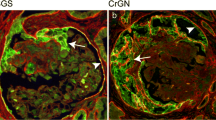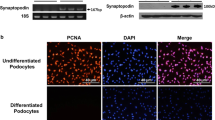Abstract.
Podocytes are highly differentiated cells that play a central role in glomerular function. Cell cycle quiescence sustained by the tight regulation of cell cycle molecules seems to be the basis of podocyte differentiation, as reflected in reciprocal expression of cyclins and cyclin kinase inhibitors (CKIs) during glomerulogenesis, concurrent with the expression of podocyte-specific markers. In addition, cell cycle re-entry by podocytes, accompanied by down-regulation of CKIs, leads to either nuclear division without cytokinesis or to marked cell proliferation, both of which result in heavy proteinuria and progressive glomerulosclerosis. These observations suggest that proper cell cycle regulation in podocytes is pivotal for their role in glomerular function and that dysregulation of this system plays a role in glomerular pathology. This review discusses the role of cell cycle molecules in the differentiation, function, and pathology of podocytes.
Similar content being viewed by others
Author information
Authors and Affiliations
Additional information
Electronic Publication
Rights and permissions
About this article
Cite this article
Nagata, M., Tomari, S., Kanemoto, K. et al. Podocytes, parietal cells, and glomerular pathology: the role of cell cycle proteins. Pediatr Nephrol 18, 3–8 (2003). https://doi.org/10.1007/s00467-002-0995-y
Received:
Revised:
Accepted:
Issue Date:
DOI: https://doi.org/10.1007/s00467-002-0995-y




